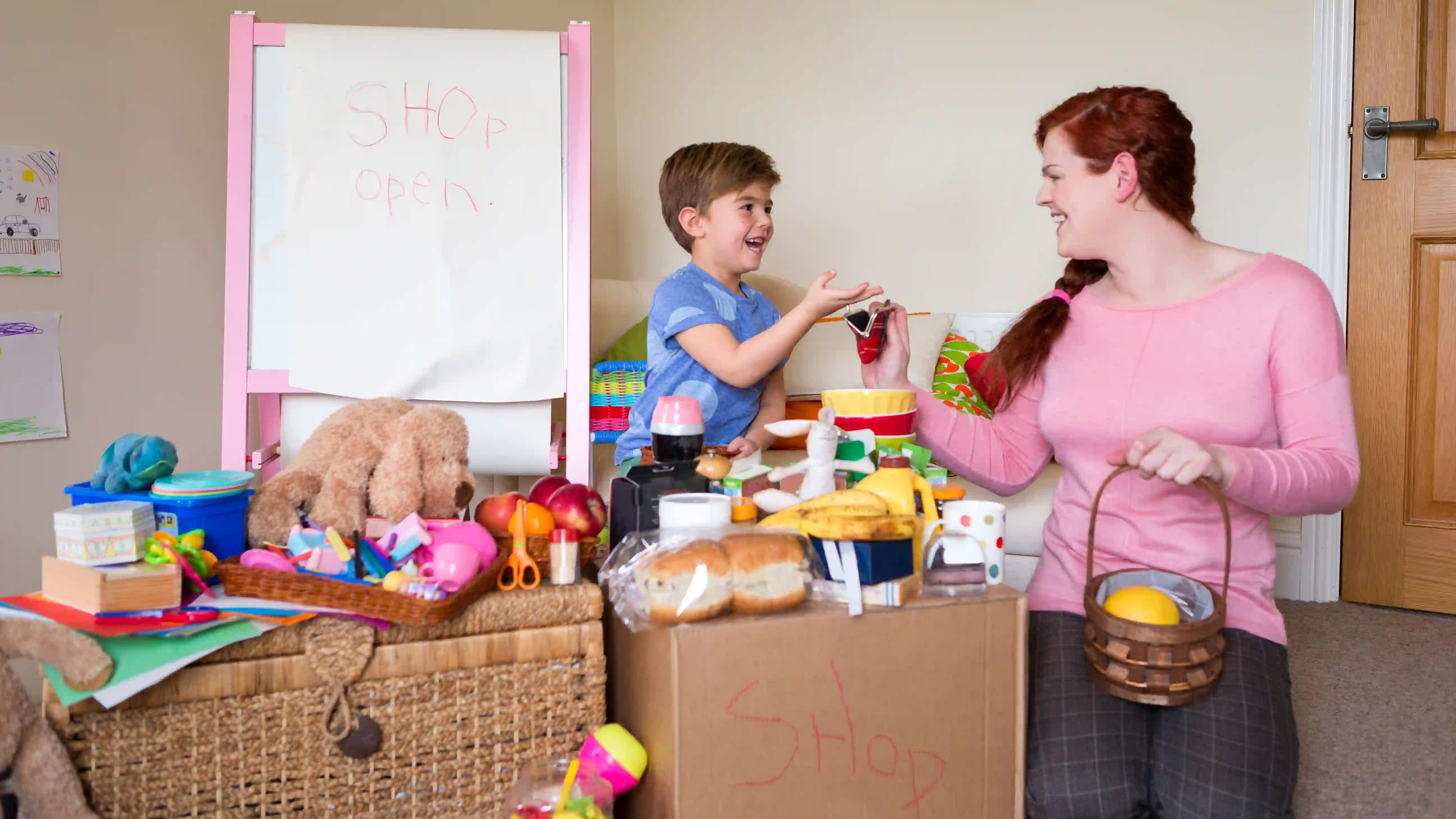
Helping your child to practice practical math skills throughout the year can lead to better retention at school. This weekly schedule provides a great starting point to practice skills including money, telling time, measurement, number sense, and problem solving.
Monday: Money
Pull out your spare change jar to engage your children in understanding the value of money. Begin by asking them to sort the coins so they can practice naming the value of each one. Then, have them compare and order the values.
Next, give them a handful of mixed coins and ask them to add up the total value. For extra motivation, let your kids keep the money if they correctly add up the sum.

Once they have the basics down, play some money-based games such as the following (and remind your kids to wash their hands at the end of each activity.)
- Play board games such as Monopoly, Payday, Life.
- Play store. As cashier, your children can charge for make-believe purchases and count out change.
- Have your children help with online shopping. Ask them to add up the total for your latest Amazon or Target order. Did you stay in budget? If not, which items can be removed from the order?
Tuesday: Telling Time
Kids can sound like a broken record asking, “Is it time for [insert any snack/meal/activity]?” Extra time at home presents a great opportunity to work on telling time on both a digital and an analog clock. With so much time on our hands, it makes perfect sense to work on the concept of elapsed time.
Help your children craft their schedules for the day including meals, schoolwork, activities, and bedtime. Encourage them to draw the start times for each activity on both an analog and a digital clock. Throughout the day, do a role reversal by frequently asking your children questions about time.
- How much time until the next activity?
- When your 30 minutes of screen time is over, what time will it be?
- If you need to do 20 minutes of reading before bed, what time do you need to start in order to be done by 7:00 p.m.?
- If we’re eating dinner, is that time a.m. or p.m.?
Wednesday: Measurement
Your home is filled with measuring tools, such as rulers, measuring tapes, scales, measuring cups, thermometers, etc. Choose one of these tools as the day’s focus. Have a discussion with your children about whether that tool is used to measure length, weight, volume, or temperature. Then, send them off with a measuring task such as one of the following:
- With a measuring cup, bake or cook something for the family or scoop out a specified amount of food to feed pets.
- With the thermometer, track the temperature at intervals throughout the day. Discuss the high and low temperatures and what time of day the temperature was warmest.
- With the ruler or measuring tape, have your children measure photo frames, walls, toys, etc. Take this activity outside and have them measure plants, lawn furniture, or even worms they dig up in the yard.

Thursday: Number Sense
The idea of number sense encompasses all the skills above and others. An overall understanding of numbers and relationships allows your children to form a solid base on which they can continue to build future math skills.
- Skip counting: Practice skip counting while using coins as manipulatives. Give each child 20 nickels and 10 dimes. Practice counting by 5s and 10s.
- Comparing and ordering: Work on comparing and ordering using multiple measuring tools such as a ruler and yard stick. Have your children determine which tool would be most appropriate for measuring various items and why. Then, ask them to measure an item using both tools and compare measures with different units such as inches versus feet.
- Estimation: Apply estimation when discussing the day’s schedule with your children. For example, if it’s 10:08 a.m. and each child gets 20 minutes of screen time, then about what time will the TV need to be turned off? Be sure to discuss scenarios when estimation is appropriate and ones where it is not appropriate.
Friday: Problem Solving
Problem solving may sound like the most daunting skill to practice, but it requires the least amount of parent prep work. As adults, we problem solve every day. Simple examples include the following:
- Do we have enough flour for this recipe?
- How many pizzas can we order while staying under budget?
- Do we have time to watch the whole movie before dinner time?
As you naturally come across such situations throughout the day, have your children help you answer these questions. Try to actively listen to their ideas and strategies more than steering the conversation toward the correct answer. Allowing them to think through the process and use trial and error to come to a conclusion will provide them the most benefit.
As you navigate the coming weeks of distance learning, remember that there is great value helping your children see the ways in which math is naturally integrated into everyday life. When your children can make these connections, they will stay engaged in math for years to come.
 Ryan Jackson recently joined the Lincoln Learning Solutions team as a mathematics teacher. She has more than 8 years of experience in online education. Ryan spends her free time traveling across the U.S. with her husband and two children.
Ryan Jackson recently joined the Lincoln Learning Solutions team as a mathematics teacher. She has more than 8 years of experience in online education. Ryan spends her free time traveling across the U.S. with her husband and two children.
Related Posts
Best Practices for Online Teaching: Class Management
At Lincoln Learning, online teaching is what we do best. No matter the reason you may be teaching...
Best Practices for Online Teaching: Assigning Work
At Lincoln Learning, online teaching is what we do best. No matter the reason you may be teaching...
Best Practices for Online Teaching: Self-Care
At Lincoln Learning, online teaching is what we do best. No matter the reason you may be teaching...